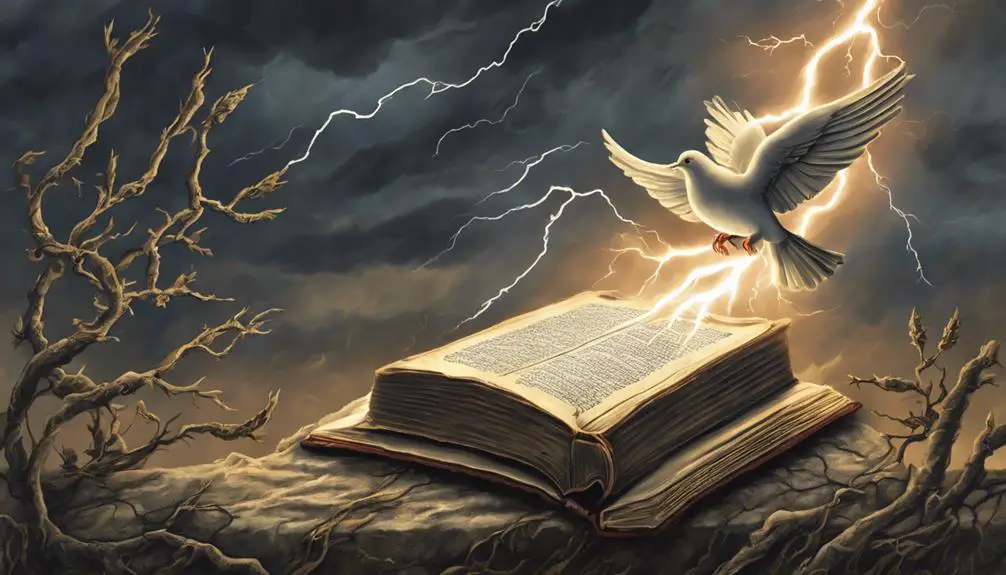Discover the Bible's most controversial verses that challenge modern ethics and spark debates on interpretation and morality.

The Worst Verses in the Bible
Just as Pandora's box unleashed complexities upon the world, so too does the Bible contain verses that challenge contemporary morals and ethics.
You've likely heard of its teachings of love and compassion, but nestled within its pages are passages that advocate for violence, endorse slavery, subjugate women, and call for severe punishments.
These verses, often overlooked, raise profound questions about context, interpretation, and the evolution of moral standards.
As you explore further, you'll find yourself at a crossroads of faith and critical thinking, where the answers aren't as clear-cut as you might expect.
Key Takeaways
- Contextualizing "worst" verses is vital, reflecting historical norms rather than current moral standards.
- Interpretation challenges arise from evolving societal values conflicting with ancient texts.
- Critical dialogue is essential in addressing verses that seem to endorse violence, slavery, or gender subordination.
- Understanding cultural and historical backgrounds enriches modern perspectives on controversial biblical passages.
Violence and Divine Commands

Throughout history, interpretations of divine commands have often been cited to justify acts of violence, raising complex ethical questions. You're plunged into a realm of moral ambiguity when you explore these justifications within their historical context. It's crucial to recognize that texts and events are products of their time, deeply embedded in the cultural, social, and political fabrics of their eras.
As you delve deeper, you find that the moral landscape of ancient societies differs vastly from contemporary norms. This isn't to excuse acts of violence but to understand the multifaceted nature of historical texts. The Bible, like many religious texts, contains passages that, when viewed through today's ethical lens, present a conundrum. You grapple with the challenge of interpreting texts that were once seen as divinely mandated yet now conflict with modern principles of peace and justice.
This journey into the past and its divine commands forces you to confront the uneasy balance between faith and the evolving standards of morality. It's a testament to the complexity of navigating religious texts and their interpretations, where historical context and moral ambiguity are forever intertwined.
Slavery Endorsements
In examining the Bible, you'll encounter passages that appear to endorse slavery, presenting a challenging ethical landscape for modern readers. These texts, when viewed through a contemporary lens, can seem deeply troubling. However, it's crucial to place them within their historical context. The societies in which these passages were written operated under vastly different social and economic systems than today's world.
Acknowledging this context doesn't excuse the practice, but it allows for a more nuanced understanding of the texts. You'll find that interpreting these passages requires a careful consideration of the times and conditions under which they were written. Scholars argue that the Bible's references to slavery are reflective of the period's norms and not necessarily a divine endorsement of the practice.
This leads to a broader conversation about moral evolution. As societies progress, interpretations and understandings of ancient texts often shift. You're witnessing an ongoing dialogue between the past and present, where current moral standards challenge historical practices. This dynamic interaction invites you to reflect on how moral perspectives evolve over time, encouraging a deeper exploration of both historical and contemporary ethical values.
Women and Subordination

Examining biblical texts reveals that passages on women and subordination reflect societal norms of their time, posing complex interpretive challenges for contemporary readers. You'll find that these texts, when viewed through the lens of cultural context, highlight the evolving nature of gender roles. This perspective allows for a more nuanced understanding of the scripture, rather than a straightforward condemnation or endorsement of these views.
Here's a concise table to illustrate some key aspects:
Aspect |
Implication |
|---|---|
Historical Context |
Reflects the patriarchal society of the time. |
Cultural Norms |
Gender roles were rigidly defined, influencing interpretations. |
Modern Interpretation |
Requires understanding the cultural context to grasp the intended message. |
Evolution of Views |
Shows a shift towards more egalitarian perspectives in contemporary discussions. |
It's essential to approach these texts with an analytical and respectful mindset, acknowledging their historical and cultural backgrounds. This approach doesn't excuse the subordination depicted but rather seeks to understand the multifaceted reasons behind these portrayals. It's a reminder that interpretations of sacred texts are deeply influenced by the societal norms of their era, challenging readers to consider how cultural context shapes understanding of gender roles.
Punishments and Intolerance
Shifting focus to another aspect, the Bible also addresses punishments and intolerance, reflecting complex moral and ethical landscapes that challenge contemporary interpreters. You'll notice that certain passages seem to endorse severe penalties and exhibit a lack of tolerance towards different groups or behaviors. This has sparked intense debates among scholars and the faithful alike, raising questions of moral ambiguity and ethical dilemmas that aren't easily resolved.
As you delve deeper, it's crucial to approach these verses with a nuanced understanding. The historical and cultural contexts in which they were written significantly influence their interpretation. What might appear as harsh or intolerant in a modern setting could have been considered a necessary aspect of societal order at the time. However, this doesn't dismiss the discomfort you might feel when confronting these texts today.
Moreover, these sections of the Bible invite you to engage in a critical dialogue about the nature of justice, mercy, and righteousness. They challenge you to consider how principles of fairness and compassion can be reconciled with instances of punitive measures and exclusivity. Navigating these waters requires a careful and thoughtful examination, respecting the complexity of the issues at hand while remaining open to diverse perspectives and interpretations.
Prophecies of Destruction

The Bible's prophecies of destruction often stir a profound unease, challenging readers to grapple with visions of divine judgment and the end times. These narratives, deeply embedded within the historical context of their times, serve not merely as forewarnings but as reflections of the moral and ethical standards of the periods in which they were written. You'll find that understanding the historical backdrop is crucial; it sheds light on the reasons behind these dire predictions and their significance to contemporary and future audiences.
Analyzing these prophecies, you're encouraged to consider the moral implications they carry. They often speak to the consequences of societal and individual actions, emphasizing accountability and the need for ethical conduct. This perspective suggests that the prophecies of destruction aren't solely about fear and punishment but also about the possibility of redemption and the importance of living a morally upright life.
In delving into these complex verses, respect for their profound impact on faith and culture is paramount. They've shaped theological thought and ethical debates throughout centuries. As you engage with these texts, approach them with an analytical mind, seeking to understand their layered meanings and the lessons they offer for today's world.
Frequently Asked Questions
How Have Interpretations of These "Worst Verses" Evolved Over Time Within Different Christian Denominations?
Interpretations of controversial verses have shifted across Christian denominations due to textual criticism and translation variability.
You'll find scholars delving into ancient manuscripts to understand the original context, which often reveals nuances lost in translation.
This scholarly approach respects the complexity of the texts and encourages a more informed dialogue within communities.
It's fascinating to see how these interpretations evolve, reflecting a deepening understanding and respect for the historical and cultural layers of the Bible.
What Role Do Cultural and Historical Contexts Play in Understanding These Controversial Verses Today?
To grasp controversial verses today, you've got to consider cultural and historical contexts. These elements shed light on translation challenges, revealing how ethical relativism influences interpretation.
By understanding the era and society in which these texts were written, you can appreciate the nuances and complexities. This approach helps avoid misinterpretation, ensuring a more respectful and scholarly analysis.
How Do Modern Theologians Reconcile the Presence of These Verses With the Concept of a Loving and Just God?
You're walking a tightrope when you delve into how modern theologians tackle controversial verses. They often employ interpretive frameworks that view these texts through the lens of divine morality, balancing the historical and cultural contexts with present-day ethics.
This approach allows them to reconcile such verses with the belief in a loving and just God. It's a nuanced process, respecting both the scripture's integrity and the evolution of moral understanding.
In What Ways Have These Verses Influenced Contemporary Social and Political Issues?
You'll find that controversial verses have significantly influenced contemporary social and political issues through media portrayal and public education. They shape debates on morality, ethics, and legal principles, often polarizing opinions.
Media coverage amplifies these discussions, affecting public perception and policy-making. Meanwhile, in public education, how these verses are interpreted and taught can influence societal values and norms, encouraging critical thinking about tradition, justice, and modern ethical standards.
How Do Other Major World Religions Address Similar Themes or Verses Within Their Own Sacred Texts?
You're delving into how major world religions approach challenging themes in their sacred texts. With 84% of the global population identifying with a religion, the comparative analysis of these texts fosters interfaith dialogue.
It's crucial to understand the nuances and interpretations that guide billions. This scholarly exploration respects diverse beliefs while shedding light on commonalities and differences, promoting a broader comprehension and respect among the world's major religious traditions.
Conclusion
In scrutinizing scripture, you've ventured through verses veiled in violence, surveyed slavery's sanction, witnessed women's waning autonomy, pondered punitive practices, and contemplated catastrophic prophecies.
This analysis, albeit brief, beckons a broader, balanced dialogue, discerning the depths of divine decrees beyond their seemingly stark surfaces.
Engaging earnestly and ethically with these texts invites illumination and insight, fostering a faith that's not blindly bound but thoughtfully tethered to the tenets of tolerance, understanding, and unconditional love.



Sign up